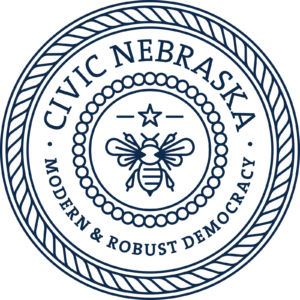Unique. One of a kind. Nebraska’s Legislature is the only one-house, nonpartisan legislative body in the United States. That makes our state an interesting footnote in lots of civics and political science texts, but what else does it get us?
Openness, access, and transparency. And those are not small things.

George Norris, who was the biggest promoter of the switch to a nonpartisan unicameral in the 1930s, said the simplified legislature would go a long way toward letting the people be the government. That, the longtime U.S. Representative and then Senator from McCook said, is the essence of democracy.
If you want to get engaged today in the policies and processes of Nebraska’s state government, you are the beneficiary of Norris’s successful vision. Here’s why.
In a small, one-house legislature, all the lawmaking goes on in one room. In a two-house body, each house passes a bill regarding some aspect of an issue – state support for schools, let’s say – but those two bills won’t be identical.
So a few members of each house are appointed to a conference committee to “reconcile” the two versions of the bill and bring back something for both houses to vote on. Up or down. Yes or no. No more opportunities for debate or amendment. Just take or leave the bill that has been, essentially, written by the small conference committee.
That doesn’t happen here because, with just one house, we don’t need conference committees. All the lawmaking happens in the open where every senator can be involved and every member of the public can see what’s happening – and can make her voice heard as the process goes forward.
The salvation of the state is watchfulness of the citizen, says an epigram carved above the north doors to the Nebraska Capitol. Watchfulness is much more likely when the institution being watched has a simple, straightforward structure.
And, because the Legislature is nonpartisan, there are no party bosses and no party hierarchy to get in the way of a constituent or a senator who wants to have a say about a particular issue. No legislative party leaders can line up the members of their party to vote as a block – because there are no party leaders and party caucuses in the Legislature.
Yes, all senators but one are registered Republicans or Democrats, and they often vote in ways one might predict: Republicans toward the conservative end of the spectrum and Democrats toward the liberal.
But senators who vote in ways that align with general party ideology are a far cry from senators who vote the way their legislative party leaders say they must. The nonpartisan unicameral allows for no party caucuses, no party leaders to direct votes and demand loyalty. Instead, senators vote sincerely for what they believe to be good public policy. Sometimes that aligns with their party’s position; sometimes it does not.
Besides that, every last bill is required to have a public hearing. Senators will testify at the hearing. Lobbyists representing various interests will testify. But so will members of the public. All you need to do is show up, sign your name and be ready to make your case when it’s your turn.
Sen. Norris would have loved what the Internet has made possible: connecting every Nebraskan with his senator, seeing the text of every bill and tracking the schedule for hearings on those bills – plus lots of other information about our state’s unique legislative process. It’s all right here for you.
If you want to be part of democracy at the state level, it’s not too tough to do that in Nebraska. Our one-house, nonpartisan system keeps our senators and their decision-making open to public view and public involvement in multiple ways. Take advantage of our unique system. Get engaged and involved!

Charlyne Berens is a retired professor and associate dean of the University of Nebraska’s College of Journalism and Mass Communications. She also is past editor and co-publisher of The Seward County Independent. She has published two books about the Nebraska Legislature.
Learn more about the Civic Nebraska Writers Group.


